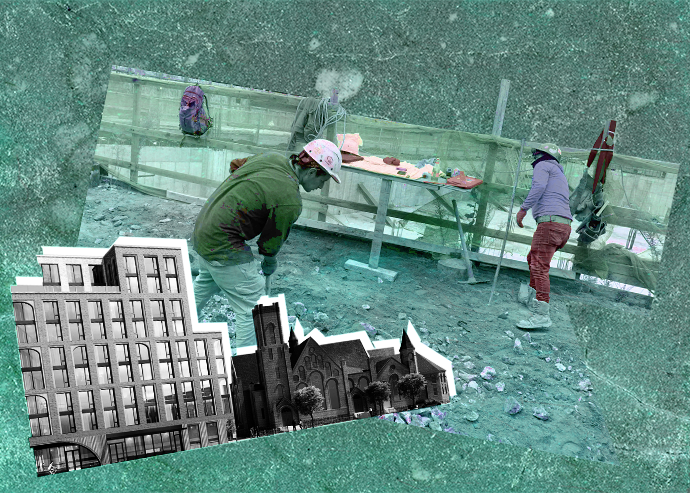
445 Grand Avenue in Brooklyn’s Clinton Hill neighborhood (Alec McCabe/The Real Deal, Ranger Properties)
That big hole in the ground in Brooklyn’s Clinton Hill is finally getting filled in.
Two years after workers dug out the foundation of an apartment building on the corner of Grand Avenue and Fulton Street, only to have it sit dormant so long that at least one tree sprouted, construction has finally started again. A completion date is even in sight.
Contractors breaking ground on the lot this week told The Real Deal that work on the nine-story residential building is slated to wrap in about two years. That end date doubles the project’s expected lead time.

Workers at 445 Grand Ave. (Credit: Alec McCabe/The Real Deal)
Ranger Properties, the site’s developer, filed plans for 445 Grand Ave. in September 2018. In the months that followed, contractors demolished a parking lot and laid a foundation.
Then, in the fall of 2019, work came to a halt. As The Real Deal reported in September, a fallout between executives at Ranger had brought a mechanic’s lien against the property, preventing the developer from securing financing and thus blocking further construction.
The unfinished building site became an eyesore and economic dead zone in the middle of bustling Clinton Hill. Weeds sprouted alongside the tree, construction fencing sagged along half a block of Fulton Street and Grand Avenue and pedestrians have been forced to share the sidewalks with Jersey barriers. One neighbor said it was attracting rats.
The breakthrough came late last month when Ranger and co-developer KD Sagamore Capital managed to snag a $40 million loan from Scale Lending, the financing arm of Slate Property Group. That allowed the project to restart.
The lien still stands, according to Russell Wolfson, an attorney representing Ranger executive Idan Nir. Nir, listed on Ranger’s website as the firm’s vice president, filed it after the developer’s managing principal, Sheldon Stein, failed to pay him, according to a lawsuit that deals with the conflict.
To circumvent the lien’s restrictions, Wolfson said Ranger probably set aside money to cover the debt, either in an escrow account or by purchasing a bond for 110 percent of the lien. The collateral would have allowed Ranger to secure financing and restart the project.
Legally, though, the site isn’t out of the woods. Ranger filed a suit against Nir in August, demanding he remove the lien. A court appearance is scheduled for Nov. 18.



